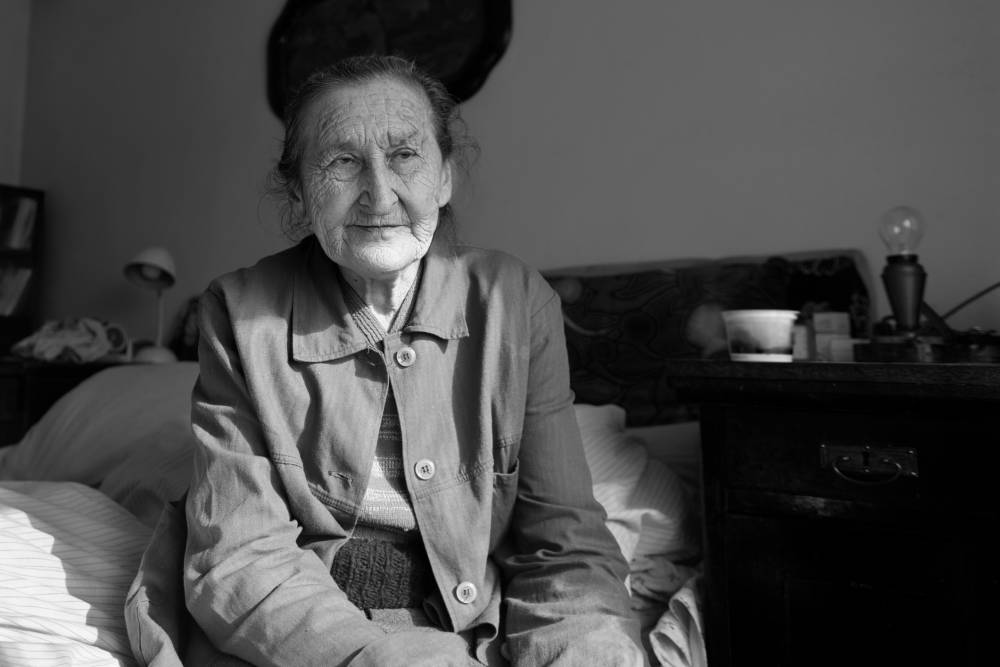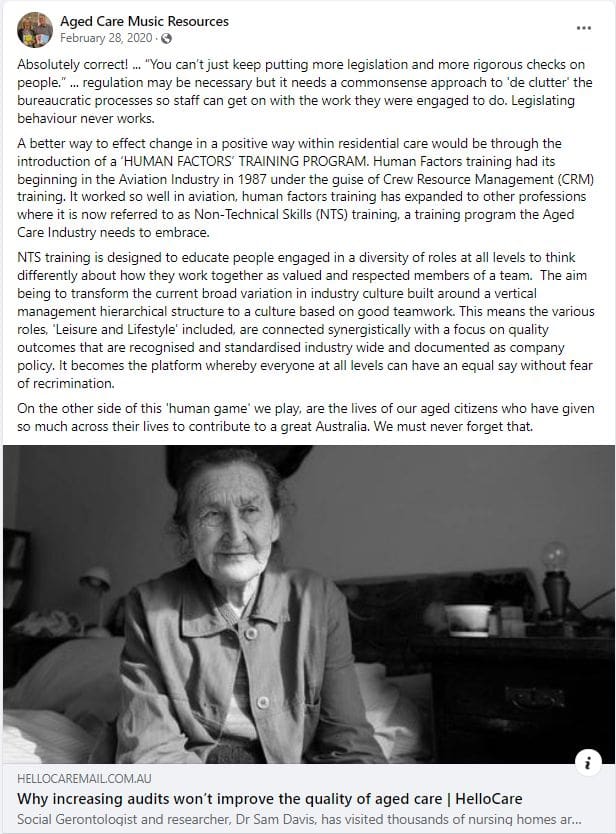Why Increasing Audits Won’t Improve The Quality Of Aged Care
Article by Caroline Egan. Jan 16, 2019 – and below, Facebook comment made by Graeme Pope, founder of Aged Care Music Resources.

The Aged Care Minister, Ken Wyatt AM MP, recently announced that unannounced re-accreditation audits will triple in 2019, and unannounced inspections will increase to more than 3,000, as the government ramps up its crackdown on aged care quality.
Public concern is high about the quality of care we provide to the oldest members of our society in the wake of the Oakden scandal and widespread media coverage of other care failures, and following a number of damning investigations into the industry.
But Social Gerontologist and researcher, Dr Sam Davis, who has visited “thousands” of nursing homes all over the world, has told HelloCare that increasing the number of audits at nursing homes won’t improve the quality of care in Australia.
Audits about punishment, not guidance
Audits are more about punishing operators who don’t comply than showing homes how to provide the best care, Dr Davis said.
“I think the providers tend to see them [audits] as punitive rather than something that’s going to guide their care,” she said.
“It takes them away from what the accreditation system is trying to mandate, which is person-centered care and how to put that into practise.”
“More visits isn’t going to help those who are struggling with the idea of providing good quality care,” said Dr Davis.
Doing more visits and putting more pressure on the organisation and the people who work for them is not appropriate way to improve the quality of care, she said.
“You can’t just keep putting more legislation and more rigorous checks on people.”
Paperwork takes staff away from providing care
Dr Davis said she believes, “The majority of the providers tend to treat it [an audit] as a checklist: these are the things we have to do and document.”
But the focus on paperwork and processes can get in the way of providing care.
“I think the kinds of things that residents will benefit from the most are being set aside to make time for the paperwork and the task-orientated approach the providers take,” she said.
Staff “terrified” of unannounced visits
Dr Davis said some staff are “terrified” of unannounced visits, which she has seen first hand when visiting nursing homes and is sometimes mistaken for an assessor.
“My colleagues and I have walked into places and where we’re doing training for example, and because we’re fairly well dressed, we look fairly important because we’re not dressed like visitors, they’re [staff are] like deers caught in the headlights.
“That’s how terrified they are of unannounced visits,” she said.
Audits are subjective
Audits findings aren’t consistent, Dr Davis said. Findings can also vary from one inspector to another.
“A surveyor will go in and, with all the goodwill in the world, they have a subjective opinion – and they are the ones interpreting the guidelines,” she said.
Dr Davis gave the example of one assessor going into a home and saying, ‘you can’t have an animal in here because it’s dribbling on the floor and that’s a risk’. But the next assessor might say, ‘isn’t it lovely you’ve got an animal in here. All the residents are really enjoying it’.
Audits put most pressure on carers who are furthest from decision making
Dr Davis said the audit process puts the most pressure on the people who are supposed to be providing care.
“The accreditation approach requires the organisation to meet the requirements which then puts pressure on the people who are supposed to be providing the hands-on care,” she said.
And audits put the most pressure on the very people who are furthest away from the organisation’s decision making, she said.
New person-centered standards a band-aid solution
The new person-centered standards won’t help improve the quality of aged care, Dr Davis said.
“You can have all the standards in the world, but you can’t keep treating something that’s not working.
“For all the money they throw at aged care – billions of dollars – and for all the money they’ve spent on trying to improve aged care, they’re really just putting band aids on an issue.
Ratios just “another big hammer”
Ratios aren’t the answer, according to Dr Davis, although she does believe that greater transparency around staffing numbers would be helpful.
Ratios are “just another big hammer” and “another numbers game”, she said.
Carers don’t have time for person-centered care
Dr Davis said she hears over and over again that staff don’t have enough time to provide proper person-centered care.
“I don’t know how many times my colleagues and I have been been told ‘we do person-centered care when we have time’,” she said.
Care staff need better recognition
The first thing that has to be done in aged care is to give staff greater recognition, Dr Davis said.
“The first thing we have to do is recognise that aged care staff, particularly the personal care workers, do a tremendous job and don’t get any credit for it. They’re poorly paid, they’re not recognised,” she said.
“It’s not sexy, it’s not respected, and yet they’re doing one of the most important jobs there is in the community,” Dr Davis said.
Australia’s aged care model needs revising
Our society need to reconsider our whole model of aged care, Dr Davis said.
“I think they need to start from scratch,” she said. The current model is very expensive and “it’s not doing the job it’s supposed to do” – proving person-centered care for older Australians.
Dr Davis, who is now retired but still works in research, says many others in working in her field share her concerns, but are not game to be open about it.
Now she’s retired, Dr Davis said she’s prepared to be “slapped over the knuckles” for speaking out.
Facebook comment made by Graeme Pope, founder of Aged Care Music Resources.
CLICK HERE or on the image to open Graeme’s comment on Facebook.

